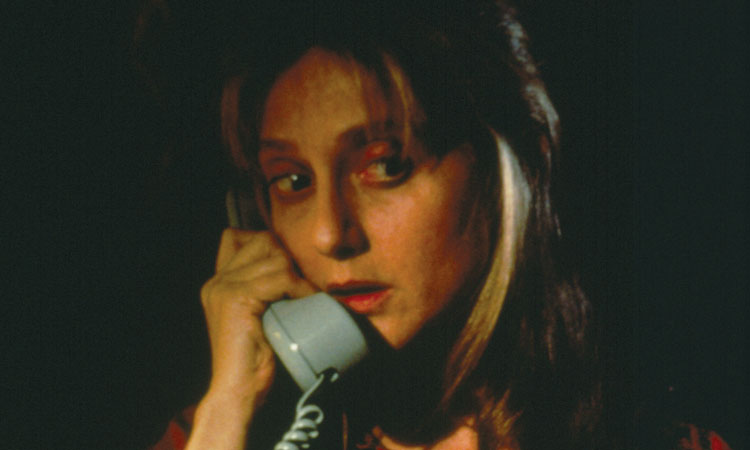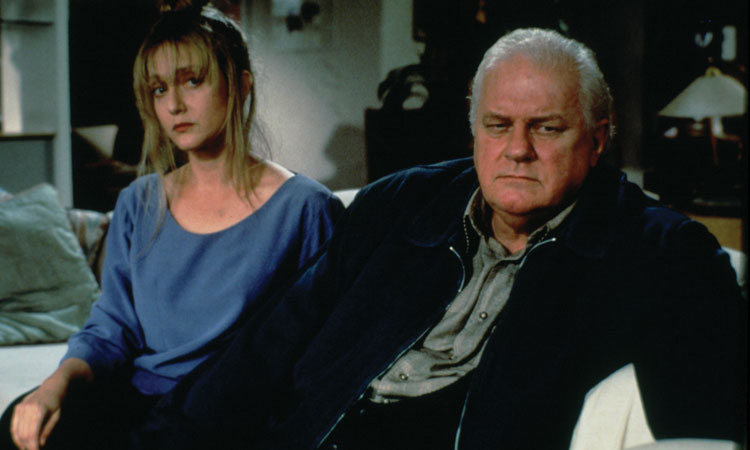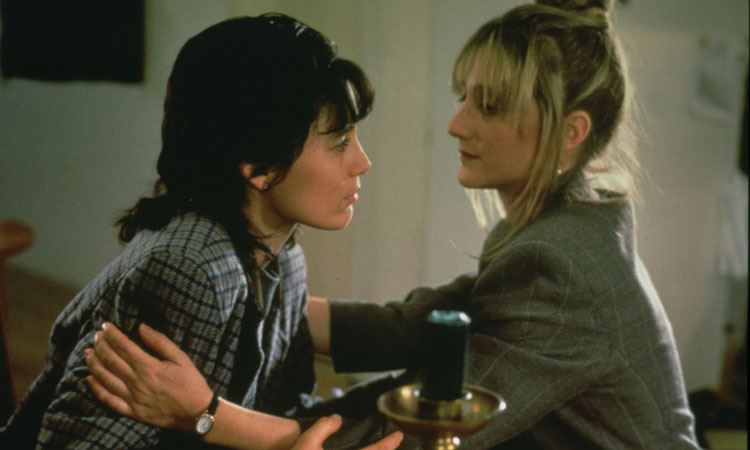Everybody knows the story. The young babysitter, all alone in the house with the kids in bed, and the telephone rings. There’s a creepy guy’s voice on the other end of the line asking “Have you checked the children?” She hangs up but the guy keeps calling back. Finally the babysitter calls the police who tells her… the call is coming from inside the house! While the “get out of the house, now!” twist had been used in Black Christmas, When A Stranger Calls taps into a different fear.
As director and co-writer Fred Walton tells us, it’s not just the idea that this could happen. People believed it already had.
Could you tell us how the short film first came about?
A friend of mine from college, Steve Feke, who wound up being the co-writer and co-producer on the feature, he and I were sitting in his place trying to figure out ways of trying to establish our careers in Hollywood and he knew somebody who was a story editor for a TV show at the time which was called Quinn Martin’s Tales Of The Unexpected. We thought if we could come up with some reasonable story ideas then perhaps we could get hired to write them. He told me this story that he claimed he had read in the newspaper in 1972 as having taken place in Brentwood which is an affluent suburb of Los Angeles. It was about this babysitter and she’s getting these phone calls, it was the story of the short and the feature. I said: “Wow, I’d never heard that before! [But] this is just a sensational story and it’s not the kind of thing that Quinn Martin would be interested in, but Steve, you and I should make this as a short because it’s so good and then hopefully we’ll be able to get work out of that.”
And the funny thing is that before we started shooting the short, which we did in three days in the spring of 1977, I would talk to friends about how I was going to make this short and it was going to be based on this particular story, and a couple of them said: “Oh yeah I know that story, my grandmother told me back when we were kids, it really scared the crap out of me.” And I thought: ‘Well, wait a minute, Steve said he had read this as taking place in Los Angeles 1972!’ So I guess there were variations of it that had occurred or the story had been around for a while, it had already achieved the status of something of an urban legend even though that term was not in use at the time. And then later when we were shooting the feature in the very first week of production, a stand-in came up to me and said: “I just realised the story you’re telling here and I want you to know that happened in my hometown when I was growing up.” And she had grown up on Long Island.
So the story was somehow already in popular consciousness even before you made the film?!
I think urban legends are based in fact in some way, there’s some basis in reality that spins off and becomes an urban legend and I think that certainly was the case with this babysitter getting these phone calls. That it had occurred in one permutation or another several times in many different places around the country or around the world. And since then I’ve come to believe that if you can imagine something, no matter how unusual or twisted, someone else somewhere in the world at some point has not only imagined it but acted on it. It’s just the way it is.
Interestingly, after the feature came out no one came up to me afterwards and said: “I heard this story.” Although they did ask me: if it were to happen again would I feel responsible? [laughs] And I said: “Well no, I would feel bad but I wouldn’t feel responsible.” I’m an artist, I get to do these sorts of things.

Did you always know that you wanted to spend the bulk of the rest of the film exploring the psyche of the killer?
No, here’s the deal. We made the short to showcase our ability and hopefully get work from that. That didn’t happen, we couldn’t get anyone who would have been in a position to hire us to look at it. Then, to qualify for the best short category at the Oscars you have to have played for at least a week in a theatre in Los Angeles or New York. So we were able to pull strings and get it into a movie theatre in LA for a week. Well, it didn’t get nominated so then we thought ‘okay, we’ve got to come up with a way to continue the story and then we can approach low budget production companies like Roger Corman or people like that and say look, here’s our script and here’s the first 20, 25 minutes in the can, finished, all we need is a couple hundred thousand dollars more and you’ll have a feature length story.’
So that’s when we came up with the idea to continue the story and it just seemed natural to focus a little bit on the killer, who I modelled after someone I knew, not at college but at home when I was in college. He wasn’t at all dangerous but he could come into a room of five or six people and without saying anything make other people in the room really uncomfortable, there was just something about his presence. And yet because I knew him and I was sympathetic towards him I felt kind of bad for him that he’s just got this bad vibe going on! That was what I informed my conception of what the killer could ultimately become, the Tony Beckley character. We got really lucky that Barry Cross who was an executive producer on the show said: “You’ve got to hire this guy Tony Beckley” and it worked out because he could be sensitive and scary. Maybe not at the same time!
It feels rare for the time to have a horror movie dedicating that much time to the character of the killer…
Yes. Charlie Durning agreed. He wanted to see the short first to be sure that this director who’d never directed anything had some sense of what he was doing, and so he saw the short and said: “Oh yeah, this is good, I want to be a part of this.” And later on, just before we started shooting, he came up to me and said: “You know, I re-read the script and I’m the bad guy aren’t I?” [laughs] And I said: “Well, you could kind of look at it that way!” We had created so much sympathy for the Tony Beckley character in that middle section and Durning was just this implacable force that was out to get him, so there you have it!

What was it like working with Carol Kane on that opening sequence? She’s essentially all alone for the first act!
Yeah, well as you might imagine it’s pretty difficult for an actor to carry a whole sequence by themselves, she’s got nothing to react to but the telephone. And certainly Beckley was there off camera reading the lines for her but she’s real talented.
Initially she said, “Well, why don’t I go up and check the children?” The way Carol works isn’t “why doesn’t the character do thus and such?” for her it’s “why don’t I do thus and such?” She doesn’t really create much distance between herself and the character that she’s playing. She would complain that she would go up and check on the kids! I said: “Well, Carol, you can’t do that, then there’s no picture, there’s no story at all! This character, she just doesn’t do it! Why should she?” So, at one point she starts up the stairs and the phone brings her back down.
Was When A Stranger Calls a hit straight away?
Yeah, it was. During the opening weekend people didn’t know much, didn’t know what it was about. But by the second weekend it was number one at the box office. And we knew, actually, because we’d had cast and crew screenings with the finished thing, and we knew this really worked, this really worked well. In fact, I think it was Milt Goldstein who was working for Mel Simon who financed the picture, he convinced Columbia who released the picture domestically to try and have a test audience, like 20 or 30 people in a screening room that were lit with infrared lights or something like this and photograph them and make that part of the TV spot for the picture, seeing these people screaming at whatever’s happening on the screen. So that became a selling point because there was a TV commercial showing people watching the movie and then shrieking. So yes, I knew that it would work.

The sequel, When A Stranger Calls Back, is excellent but it’s a shame it never got a theatrical release! How did it come about?
Well, shortly after the original came out, they talked about doing a sequel and I said, “Well you can’t do a sequel, the killer’s dead!” That’s it, end of story and I wasn’t much into the idea of doing a sequel anyway because I didn’t consider myself particularly a genre guy, I happened to come across this one story that I really liked but it’s not as if I wanted to focus on just scary movies.
In any event, time went by and I needed money, I needed work and this frequently happens – you’re driving around LA and you’re alone in the car and thoughts come to you. And I had this idea of a variation of the opening act of Stranger but this time with someone actually at the door instead of on the phone, requesting help because his car had broken down, that was my original idea. And because I needed money, I went to Doug Chaffin who was the co-producer on the original and I told him I had this idea and I asked what he thought of it. He said: “Oh yeah, that’s great, let’s go set it up.” So it was set up at 20th Century Fox and we developed a script for it, and then it decided it didn’t want to do it and then Showtime decided it would do it so that’s how that worked.
Carol Kane and Charles Durning make such a good team…
You know, shortly after I finished When A Stranger Calls Back I got the idea for another one and in this case, again it involved Carol and Charlie Durning and a new victim but in this one Carol Kane was killed off and Charlie Durning’s character manages to carry on without her but at the very end he just dies as it happens, it’s just a heart attack. So I was killing them off and I talked to Carol about it and she wasn’t… she had some concerns about having her character killed off but I said: “Look, Carol, we can’t have a series with you and Charlie just bopping around the country like The Avengers or something, it’s just silly! So I think it’s time to end your character.” She ultimately agreed and then this script was developed for Miramax but ultimately Miramax decided that it didn’t want to do it because everybody’s an expert and it thought it was…[sigh] whatever, so it didn’t get made.
When A Stranger Calls and When A Stranger Calls Back are available now on Blu-ray from Second Sight.
